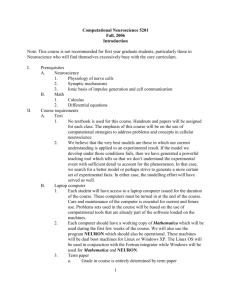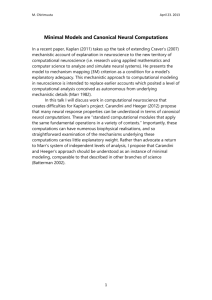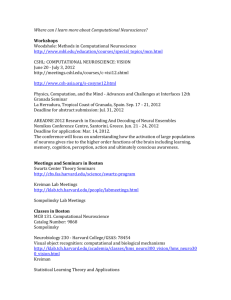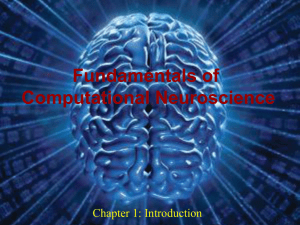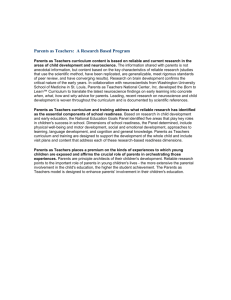Computational Neuroscience
advertisement
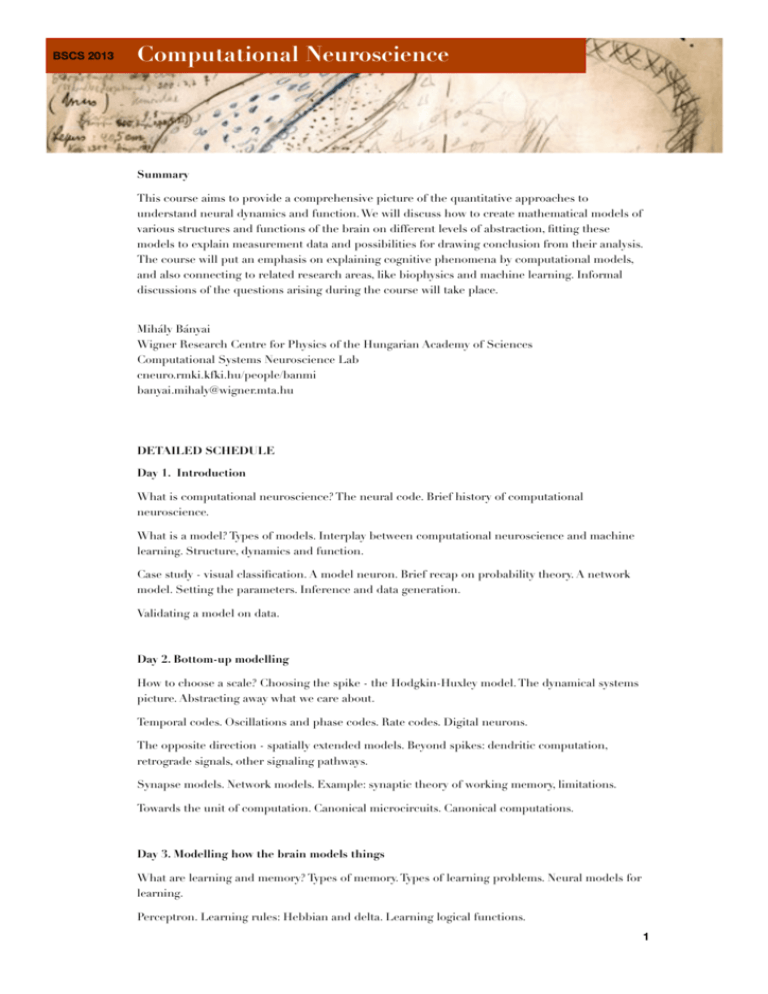
BSCS 2013 Computational Neuroscience Summary This course aims to provide a comprehensive picture of the quantitative approaches to understand neural dynamics and function. We will discuss how to create mathematical models of various structures and functions of the brain on different levels of abstraction, fitting these models to explain measurement data and possibilities for drawing conclusion from their analysis. The course will put an emphasis on explaining cognitive phenomena by computational models, and also connecting to related research areas, like biophysics and machine learning. Informal discussions of the questions arising during the course will take place. Mihály Bányai Wigner Research Centre for Physics of the Hungarian Academy of Sciences Computational Systems Neuroscience Lab cneuro.rmki.kfki.hu/people/banmi banyai.mihaly@wigner.mta.hu DETAILED SCHEDULE Day 1. Introduction What is computational neuroscience? The neural code. Brief history of computational neuroscience. What is a model? Types of models. Interplay between computational neuroscience and machine learning. Structure, dynamics and function. Case study - visual classification. A model neuron. Brief recap on probability theory. A network model. Setting the parameters. Inference and data generation. Validating a model on data. Day 2. Bottom-up modelling How to choose a scale? Choosing the spike - the Hodgkin-Huxley model. The dynamical systems picture. Abstracting away what we care about. Temporal codes. Oscillations and phase codes. Rate codes. Digital neurons. The opposite direction - spatially extended models. Beyond spikes: dendritic computation, retrograde signals, other signaling pathways. Synapse models. Network models. Example: synaptic theory of working memory, limitations. Towards the unit of computation. Canonical microcircuits. Canonical computations. Day 3. Modelling how the brain models things What are learning and memory? Types of memory. Types of learning problems. Neural models for learning. Perceptron. Learning rules: Hebbian and delta. Learning logical functions. 1 Computational Neuroscience Feed-forward network. Error backpropagation. Reinforcement learning with neural models. State space represeantations. Temporal difference learning. Hopfield network. Attractor dynamics. Day 4. Representing uncertainty and learning structure From uncertainty to probability and other choices. Probabilistic models. Causality. Perception as probabilistic inference. Probabilistic perceptron. Possible representations of random quantities in the cortex. Probabilistic extension of the Hopfield model. Boltzmann machines. Sampling from a distribution. Learning distributions. Choosing an optimal model. Learning the structure of the data. Prerequisites Only understanding of basic mathematical principles will be assumed. All used mathematical concepts from calculus, algebra, dynamical systems and probability theory will be thoroughly discussed. If needed, references to textbook material on mathematical concepts will be provided. Basic biological knowledge of neural systems and measurement techniques will be assumed on the level provided by preceding BSCS courses. Recommended reading The course does not follow a single textbook, certain chapters from the following books cover most of the material: P. Dayan and L. F. Abbott: Theoretical Neuroscience C. M. Bishop: Pattern Recognition and Machine Learning R. P. N. Rao, B. A. Olshausen and M. S. Lewicki: Probabilistic Models of the Brain D. Marr: Vision C. Koch: Biophysics of Computation The following articles from the Scholarpedia Encyclopedia of Computational Neuroscience provide additional details and overviews of some topics of the course: http://www.scholarpedia.org/article/Working_memory http://www.scholarpedia.org/article/Models_of_visual_cortex http://www.scholarpedia.org/article/Conductance-based_models http://www.scholarpedia.org/article/Thalamocortical_oscillations http://www.scholarpedia.org/article/Attractor_network http://www.scholarpedia.org/article/Boltzmann_machine 2 Computational Neuroscience http://www.scholarpedia.org/article/Hopfield_network http://www.scholarpedia.org/article/Reinforcement_learning http://www.scholarpedia.org/article/Temporal_difference_learning http://www.scholarpedia.org/article/Bayesian_statistics Exam There will be a written exam covering all topics on Day 5. 3
